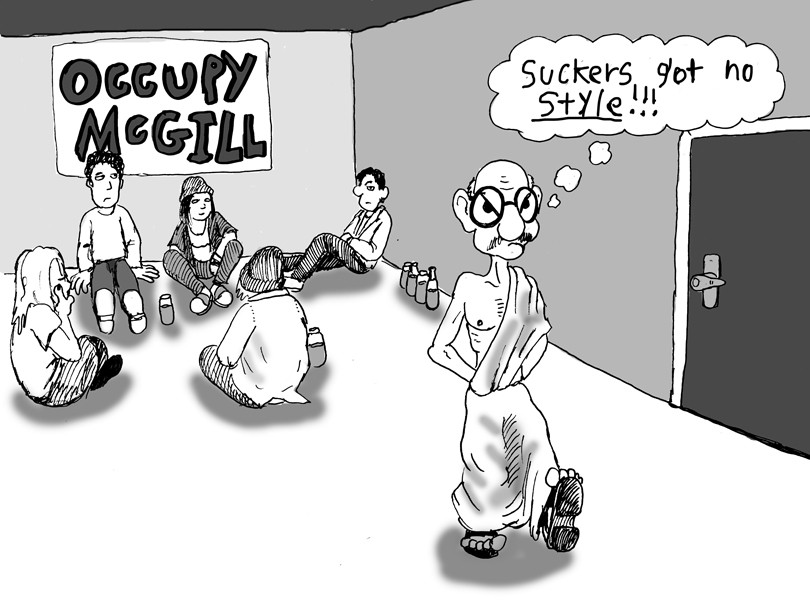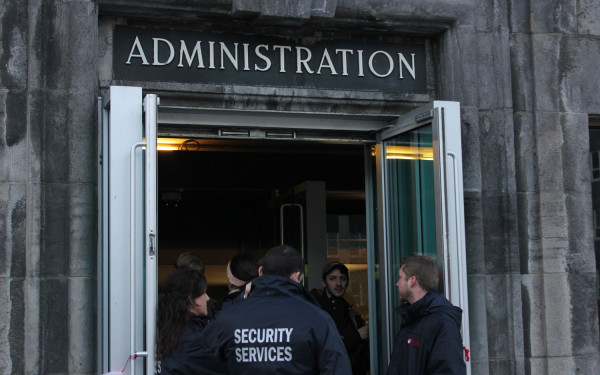Editorial
Ain’t No Party Like A #6party
When a contingent of 23 students took over the sixth floor of McGill University’s James Administration Building last Tuesday, their actions initially seemed warranted.
The referendum last November regarding the fee levies for campus radio station CKUT and the Quebec Public Interest Research Group saw students vote overwhelmingly in favour of shifting the opt-out method from online to in-person, effectively making it more difficult for students to opt out of the fee levies.
Student money funds these organizations, so it makes sense that the question of their existence remains in the hands of the students.
When the McGill administration chose to overturn the results of the referendum due to a perceived lack of clarity in the referendum question’s phrasing— without consultation from the students who actually voted—it was easy to sympathize with the occupiers’ cause.
But after thinking about the occupation a bit more, it’s clear that they didn’t choose the best way to get their message across.
Regardless of the financial issues with the occupation (To get an idea of the cost, consider how much security was required to keep an eye on the students for the 118 hour occupation, and then think about how much security guards get paid per hour, and then multiply that by 1.5, to account for overtime pay), the occupiers successfully united a large portion of the campus in the fight against their cause.
When something as daunting as the tuition hike looms over the heads of Quebec students, the last thing any of us need is to be pitted against each other by an administration that couldn’t care less.
Yes, it was not the administration’s job to overturn a student referendum, and yes, they should’ve left the task to the Students’ Society of McGill University (who were already conducting an investigation into the questionable wording of the referendum questions), a union whose job it is to represent students.
But occupying the Administration Building and shutting it down as a result is not the best way to get your demands met.
The Feb. 12 eviction of the last remaining occupiers, leaving with their demands unmet, showed us this.
There are better ways to have your voice heard; ways that don’t result in a large portion of students gleefully waiting for the moment the Service de Police de la Ville de Montréal finally busts down the doors to haul you out of the building. This isn’t the 1960s, and it isn’t time for another Computer Riot-esque situation, especially over something like a better opt-out method.
When the occupiers were finally evicted in the wee hours of Sunday morning, all they had to show for their efforts were a few banners and an impressively constructed pulley system for getting food to the sixth floor.
They will undoubtedly face disciplinary action, especially given the mass concern expressed by those opposed to the occupation that the school has become a “consequence-free environment.”
Sunday evening, McGill Provost Anthony Masi and VP Administration and Finance Michael Di Grappa issued a temporary protocol for demonstrations and protests on campus.
The protocol will tide the university over until McGill officially responds to Dean of Law Daniel Jutras’ report regarding the events of Nov. 10, but it’s unclear when that will be. It’s quite possible the protocol will still be in effect for the student strikes planned for March.
That’s worrisome, given the content of the protocol. While the phrasing used (“Demonstrations and protests may occur and will not be interfered with unless…”) might suggest a willingness to put up with future student protests, the guidelines are troublingly restrictive.
Should a future protest “impede the conduct of University activities,” “obstruct access to, or egress from, buildings” (here’s looking at you, sit-ins) or even so much as “continue beyond the normal operating hours of the University facilities in which they occur,” they’re almost certainly going to be shut down, and you can bet the McGill admin won’t wait 118 hours before acting.
The new guidelines are incredibly constraining and will not only ensure nothing like the so-called #6party will happen again, but that any future protest will be looked at much more stringently.
So, let’s recap: not only did the occupiers not receive what they demanded, they also, as a small group of students acting unilaterally, brought down draconian policy changes that can be loosely interpreted on a student body of 25,000-plus—for an indefinite period that may last through the most important student protests of the last several years.
This is not meant to downplay the poor treatment the occupiers suffered at the hands of the McGill administration—restricting access to working plumbing and food is cruel and reprehensible—but the occupiers should have considered the possibility that such things would happen before they chose to speak on behalf of all students using tactics that are best left for situations much more dire than an opt-out method.
There are bigger things at stake these days, and a divided campus under the shadow of an angry administration is one ill-equipped for the fight.






WEB_600_375_90_s_c1.jpg)
